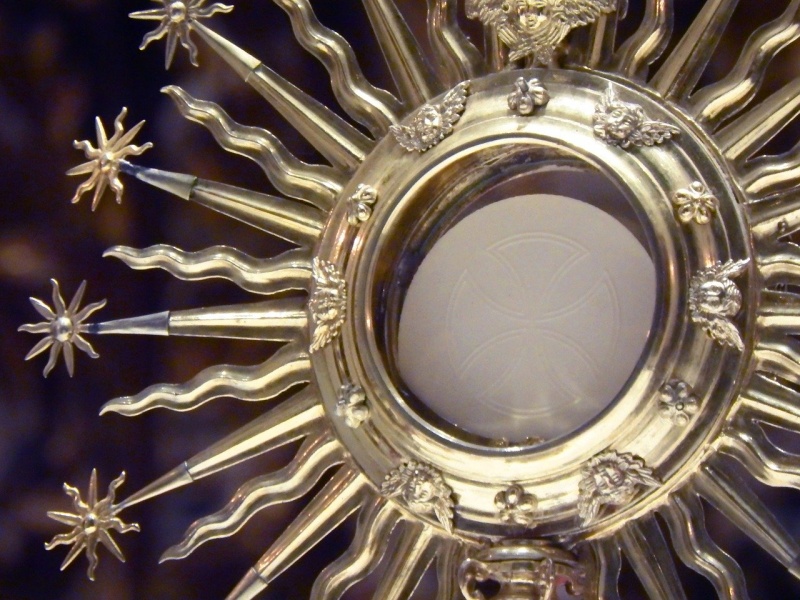
Hungary is preparing for a Eucharistic Congress
The 52nd International Eucharistic Congress will be held in Budapest between the 13th and 20th of September. Let's hope that the coronavirus and safety measures won't stand in its way, but it is worth looking at it in the context of the events in Italy. Italian Catholics have just been deprived, for a few weeks at least, of the possibility to attend a service, a Catholic funeral or even to receive Holy Communion. Why are so many people appalled by the decision of the Italian bishops? What is the Eucharist for Catholics and where does the idea of organizing congresses devoted to it come from?
THE FIRST CONGRESS
The idea to hold eucharistic congresses dates back to the 19th century. It was coined by a laywoman Marie Tamisie and received support from Peter Julian Eymard, known as the "Apostle of the Eucharist", who was later to become a Catholic priest and a Saint. Overcoming difficulties, with the help of the clergy and blessing of Pope Leo XIII, Lille hosted the 1st International Eucharistic Congress in 1881. Its theme was "The Eucharist Saves the World". Since then, congresses have been held every 4 - 5 years in different countries and on different continents. The date and venue are chosen by the Holy Father and an Episcopal Conference from the country in question. Budapest had already hosted a eucharistic congress in May 1938. A congress was only held in Poland once, in Wrocław, at the turn of May 1997. Eucharistic congresses (and not only international, but also national and regional) strive to awaken and bolster Eucharistic piety. Celebrating the Eucharist together, adorating the Blessed Sacrament, Eucharistic processions as well as scientific conferences and lectures all help that cause.
A CENTRAL POINT
The Eucharist is a central point in the life of the Church as well as each and every Catholic. The Eucharist was initiated by Jesus Christ, who instructed his disciples to follow suit. The word "Eucharist" refers to the entire Hoyt Mass and also means the consecrated bread and wine, which – we believe – are the true body and blood of Christ. "In the sacred sacrament of the holy Eucharist, after the consecration of the bread and wine, our Lord Jesus Christ, true God and man, is truly, really, and substantially contained under the species of those sensible things" (Council of Trent, Decree on the Blessed Sacrament). Through the Blessed Sacrament believers practice devotions to God, Jesus Christ. Consuming the Eucharist strengthens, heals and protects believers whilst preparing them to meet their Lord after they die. In the Catholic Church, receiving the Eucharist for the forest time is a celebration. The Eucharist accompanies the faithful throughout their lives (they are obliged to receive it at least once a year), right up to the Viaticum - Communion administered to a person who is at risk of dying.
Throughout the centuries, in the face of various threats, including epidemics, people have been turning to God, seeking salvation in Him. There were services, numerous sacraments and processions with the Blessed Sacrament. This is what St. Charles Boromeo, the Archbishop of Milan, did, for example, when in 1577, during a smallpox epidemic, he led a penitential procession barefoot through the streets of the city. After the procession, the epidemic was stamped out. Whereas this time in Italy, in the face of the threat, the bishops decided that the churches will be closed and that the administering of the Holy Communion would be abandoned, as it would encourage the spread of the epidemic. Many see it as treason, others at least as a denial of the Church's teachings and tasks. The faithful who have been deprived of the opportunity to participate in the Eucharist continue to pray in their homes as part of the "Corona(anti)virus" - a relay of the rosary announced on the Internet.
BUDAPEST, SEPTEMBER 2020
This year's 52nd International Eucharistic Congress will be held under the "All my fountains[k1] are in you” theme. "That motto – explained Cardinal Péter Erdő, Primate of Hungary and host of the Congress – comes from the last verse of Psalm 87. The psalm also talks about Jerusalem, and that it was the birthplace of all nations. This means that we have to open our hearts to other nations[1]”. The congress has attracted considerable interest in Hungary. Those behind the congress managed to reach young people and now they can rejoice in watching a revival of religious life in the country. The Blessed Sacrament adoration rite is resurfacing in Hungary. "Such great interest in the Eucharistic Congress is due to the fact that people today are hungry and thirsty. Consciously or unconsciously, they want to meet Jesus. We're not the ones who are awakening their interest. They are drawn to our message. And that's what we should give them. This is what we must strive to ensure that our testimonies are authentic. There are also signs indicating that certain cultural changes are underway. For example, the rising popularity of Blessed Sacrament adoration and perpetual adoration. Dozens of years ago it was thought that this was only a manifestation of tradition, folk piety, while today it is the young who seek opportunities for Eucharistic adoration. As a result, many churches have introduced adoration - either permanently or at least periodically - while a church is open." - Cardinal Péter Erdő, Primate of Hungary told the Vatican Radio.[2]
The Congress programme is quite extensive. It includes an opening Mass with First Communion, morning plenary sessions, workshops, prayers, testimonies and catechesis, a Eucharistic procession, evening meetings for young people, a closing Mass, and many cultural attractions for participants of all ages, including families. There are many famous figures from all over the Catholic world among the speakers and leaders, such as Cardinal Robert Sarah from Guinea, Cardinal Timothy Dolan from New York, Cardinal Rainer Maria Woelki from Cologne, Chairman of the Pontifical Committee for International Eucharistic Congresses, Archbishop Piero Marini from Italy, Archbishop Stanisław Gądecki from Poznań, secular evangelist and charismatic Damian Stayne from London, Greek Catholic priest Konstantin Szabó from Transcarpathia and of course Cardinal Péter Erdő. Pope Francis is expected to take part in the Eucharist at the close of the Congress.
There is vast interest in the Congress. More than 50 thousand participants from 80 countries have registered so far. Individuals and groups can register. Father Paul Cebula OFM Conv, parish priest in Eger, encourages Poles to participate in the Congress in large numbers and to register quickly. The more Poles we have here, the cheaper the pilgrim's packages will be for them, and with a sufficient number of participants from our country, lectures and conferences will be translated into Polish. It is worth signing up, all the more so because Hungary is close, and the mutual kindness between Poles and Hungarians will make the trip to Budapest for the Eucharistic Congress not only fruitful, but stay in the memories of Polish participants for a long time to come.
w.

P.S. Due to the state of emergency in Hungary and the ban on indoor events for more than 100 people and outdoor events with more than 500 participants, it is not certain whether the Eucharistic Congress in Budapest will ultimately take place. When asked a few weeks ago by Radio Kossuth about the coronavirus, Cardinal Péter Erdő stressed that measures, similar to those used during an influenza epidemic will be taken: Holy Communion placed in the hand, nod in place of the kiss as the sign of peace, commitment of the faithful and priests to wash hands frequently. There are still five months left until the Congress and we'll know whether it will take place or not by that time.
Marta Dzbeńska-Karpińska
For information about the Congress and to register see: https://www.iec2020.hu
[1] Quote as cited in: https://liturgia.wiara.pl/doc/5528034.Budapeszt-2020-zostalo-500-dni, accessed on 10.03.2020
[2] Quote as cited in: https://liturgia.wiara.pl/doc/6011196.Budapeszt-2020, accessed on 10.03.2020
